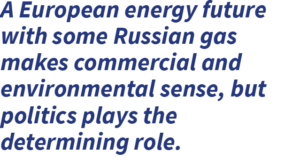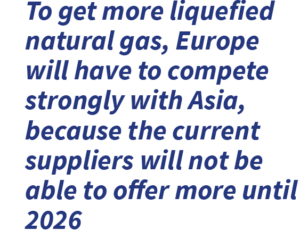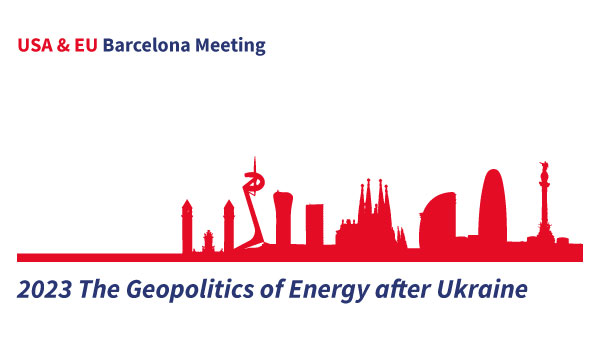Dr. Katja Yafimava “Europe is sourcing its gas from a variety of suppliers from the global market, with LNG becoming the single largest source”

With an unforeseeable end to Russia’s war on Ukraine, uncertainty looms among us all amidst the world facing mass economic recessions and now, with the energy crisis reaching unprecedented heights, further pushing states and individuals into poverty levels. The European Union was able to survive the first winter after Russian gas supplies have fallen dramatically, but without solidified plans in place to import from reliable and affordable partners the future will look bleak, grim and have chilling effects.
Hence the initiation of Institut d’Estudis Nord-americans (IEN) to host its second edition of the US & EU Barcelona Meeting, 2023: The Geopolitics of Energy after Ukraine. The meeting will provide “expert vision, reflection and greater details” from institutional representatives, scholars and diplomats. With us, we have one of the panelists, Dr. Katja Yafimava, Senior Research Fellow on the Oxford Institute for Energy Studies Gas Research Programme to gain a sense of the challenges that the US & EU are facing. Challenges in which we hope to address and provide formidable pathways to solutions throughout the conference.
With a surge in electricity and gas prices, there is a debate forming from the public and some government officials regarding whether sanctioning Russia’s energy sources is strangling the Russian economy as intended. Why would sanctions not be efficient in this case?
The West has responded to 24 February 2022 with massive sanctions on multiple sectors of the Russian economy, hoping that these sanctions would reduce its ability to finance military action in Ukraine. Now, one year on, it is clear this has failed. The Russian economy has been able to withstand the challenge although sanctions will have a negative longer-term impact. Personally, I’ve felt from the start that it was a folly to believe that sanctions could crush the Russian economy given how large it is and how well integrated it is in the global economy, both with Western and non-Western countries. There are three main reasons why sanctions proved largely inefficient. Firstly, it is due to Russia’s strength as an energy exporter (particularly, oil, oil products and gas). Mindful of its own vulnerability to oil price shocks, the EU has not imposed sanctions on Russian oil and oil products straight away, but only in December 2022 and February 2023 respectively, and Russia has been able to re-direct flows. No matching sanctions have been imposed in respect of the Russian gas sector, given Europe’s significant dependence on Russian gas (although there are sanctions impacting technical maintenance and LNG technology). Secondly, the response of the Russian government’s economic team has been very professional, deterring a lot of potentially negative consequences. Lastly, just as the West is diversifying its economy away from Russia, Russia is also diversifying its economy away from the West by moving to Asia; massive rebalancing and reconfiguring is taking place. It demonstrates just how interconnected the global economy has become: it is impossible to isolate a powerful economic actor like Russia without having severe lasting negative consequences across the world.
 We are often reminded that Europe’s overall energy dependence on Russia for liquified natural gas (LNG) grew by over 40% by 2021, who is Europe turning to and can those relationships morally and financially last?
We are often reminded that Europe’s overall energy dependence on Russia for liquified natural gas (LNG) grew by over 40% by 2021, who is Europe turning to and can those relationships morally and financially last?
Cutting gas ties with Russia would result in Europe losing ~⅓ of its gas supplies on a permanent basis, which inevitably would impact prices at which Europe would be able to attract alternative supplies. Europe is sourcing its gas from a variety of suppliers from the global market, with LNG becoming the single largest source, mostly from the US (~40%) and Qatar (~13%) but also others. The difficulty is that there is not going to be additional supply until 2026-27, thus suggesting a fierce global competition for limited existing supply. Europe has been able to attract significant volumes of LNG imports from the global market but poorer countries such as Pakistan, India and Bangladesh were priced out (e.g. Pakistan experienced widespread blackouts). All existing pipeline gas suppliers in Europe such as North Africa, Norway, Azerbaijan, etc. have provided stable volumes of gas to Europe, but are unable to increase supply significantly in the short term. Europe was luckily able to reduce its gas demand, first, due to relatively mild temperatures this winter leading to lower demand for residential heating and secondly, because the increase in prices reduced gas usage in industry, which in effect balances the market but harms the industry.
As of 2011, the US outperformed Russia becoming the world’s largest producer of LNG and now, there are arguments that the high demand for exporters can serve as an opportunity for the US to emerge as the largest LNG exporter globally. Will this complicate the relationship between the US and the EU?
If the assumption is that Russian gas is phased out of the European gas balance completely, it leaves Europe very exposed to the LNG market. Imports of LNG have increased about 60% just in one year to replace Russian gas, most of the increase came from the US and Qatar. An important factor in this equation is the EU’s net-zero policies, in line with which the EU has a legally binding target of reducing its net green-house gas (GHG) emissions by 55% by 2030 (compared to 1990), and to become climate neutral (net-zero) by 2050. For this scenario, there is not much space for unabated methane in the longer term. Having this target complicates conclusion of new LNG contracts as LNG exporters (such as the US as well as others) are seeking long term contracts with a duration of 20 years or more to finance their investments, while European buyers are reluctant to conclude contracts with a duration in excess of 10 years as they do not know for how much longer they would need the gas. On its part, China has recently signed 20-year contracts with a US LNG supplier. The US LNG exporters will deliver gas to Europe if mutually acceptable commercial contracts are signed, and it remains to be seen if such a framework will be found. If there is a belief that an allied status between the EU and the US will replace economics, in my view such belief is misplaced.
In your opinion, what will be the biggest obstacle facing the West in terms of moving forward in solidarity with a Russian-less energy supply?
It is difficult to tell because ultimately each country will have its own national interest and will value it higher than the national interests of its allies, even if they are allies. Which is not surprising, that is how it is. One could see a situation where those interests align and one could see situations where those interests are divergent. And of course, when they are divergent there will have to be difficult decisions to be made – both commercial and political. And solidarity will go as far as it is domestically acceptable to the domestic electorate in respective countries. There are limits to how far it might extend.

What message do you most wish to get across at the meeting?
That Europe is really facing a choice: a future with or without Russian gas. Without it, Europe will become much more dependent on LNG, which has already become its main source of supply, and will be exposed to changes in the global LNG market. Europe will have to compete fiercely with Asia during the next few years and potentially also well into the 2020s. In the short term i.e. for the next two winters, prices are likely to stay high and volatile and there could be gas rationing (particularly in Germany and central and eastern Europe). By 2026-27 the European gas market will rebalance, as more additional LNG becomes available and more infrastructure will be built to accept it, but it would rebalance at a higher gas price than pre-crisis. Given such price outlook some European industries may have to close/relocate elsewhere.
On the other hand, a future with some Russian gas – but at a much lower level than before 24 February 2022, so as to not put Europe in a similar security of supply crisis – makes sense from a commercial and environmental point of view. It would also allow to moderate Europe’s high dependence on imported LNG. But of course, politics is such that even for a low-key return of Russian gas into Europe to be considered, in a certain time frame, one has to see a resolution of the Ukrainian conflict. And that is not an energy question, it’s a political and military question. The answer to it depends on when it is resolved, how it is resolved, whether a solution will be such that everyone can live with it. If such resolution proves impossible, the future of Russian gas in Europe would likely be foreclosed.
Whichever future Europe chooses (or finds itself in), both futures would come with attendant risks.







